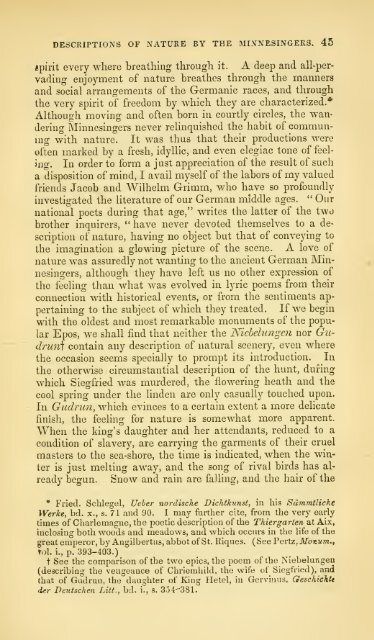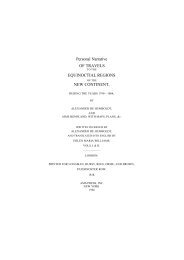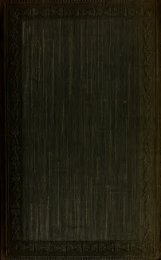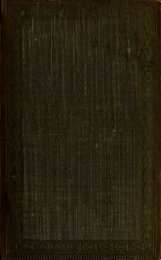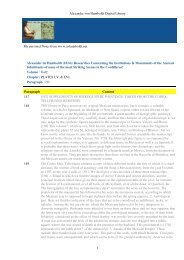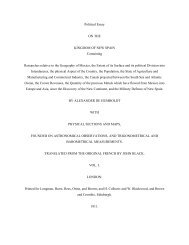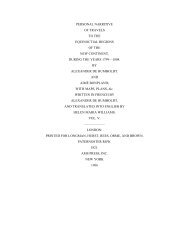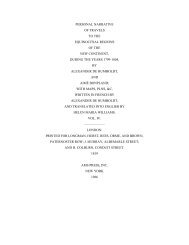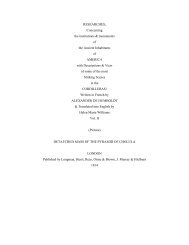See the complete document here
See the complete document here
See the complete document here
You also want an ePaper? Increase the reach of your titles
YUMPU automatically turns print PDFs into web optimized ePapers that Google loves.
DESCRIPTIONS OF NATURE BY THE MINNESINGERS. 45<br />
spirit every w<strong>here</strong> breathing through it. A deep and all-per-<br />
vading enjoyment of nature brea<strong>the</strong>s through <strong>the</strong> manners<br />
and social arrangements of <strong>the</strong> Germanic races, and through<br />
<strong>the</strong> very spirit of freedom by which <strong>the</strong>y are characterized.*<br />
Although moving and often born in courtly circles, <strong>the</strong> w'andering<br />
Minnesingers never relinquished <strong>the</strong> habit of communing<br />
with nature. It was thus that <strong>the</strong>ir productions were<br />
often marked by a fresh, idyllic, and even elegiac tone of feeling.<br />
In order to form a just appreciation<br />
of <strong>the</strong> result of such<br />
a disposition of mind, I avail myself of <strong>the</strong> labors of my valued<br />
friends Jacob and Wilhelm Grimm, who have so profoundly<br />
investigated <strong>the</strong> literature of our German middle "<br />
ages. Our<br />
national poets during that age," writes <strong>the</strong> latter of <strong>the</strong> two<br />
bro<strong>the</strong>r inquirers, " have never devoted <strong>the</strong>mselves to a de*<br />
scription of nature, having no object but that of conveying to<br />
<strong>the</strong> imagination a glowing picture of <strong>the</strong> scene. A love of<br />
nature Avas assuredly not wanting to <strong>the</strong> ancient German Minnesingers,<br />
although <strong>the</strong>y have left us no o<strong>the</strong>r expression of<br />
<strong>the</strong> feeling than w4iat was evolved in lyric poems from <strong>the</strong>ir<br />
connection with historical events, or from <strong>the</strong> sentiments appertaining<br />
to <strong>the</strong> subject of which <strong>the</strong>y treated. If we begin<br />
with <strong>the</strong> oldest and most remarkable monuments of <strong>the</strong> popular<br />
Epos, we shall find that nei<strong>the</strong>r <strong>the</strong> Nicbehmgen nor GudTU'}i\<br />
contain any description of natural scenery, even w<strong>here</strong><br />
<strong>the</strong> occasion seems specially<br />
to its prompt introduction. In<br />
<strong>the</strong> o<strong>the</strong>rwise circumstantial description of <strong>the</strong> hunt, during<br />
which Siegfried was murdered, <strong>the</strong> flowering heath and <strong>the</strong><br />
cool spring under <strong>the</strong> linden are only casually touched upon.<br />
In Gudrun, Avhich evinces to a certain extent a more delicate<br />
finish, <strong>the</strong> feeling for nature is somewhat more apparent.<br />
When <strong>the</strong> king's daughter and her attendants, reduced to a<br />
condition of slavery, are carrying <strong>the</strong> garments of <strong>the</strong>ir cruel<br />
masters to <strong>the</strong> sea-shore, <strong>the</strong> time is indicated, when <strong>the</strong> win-<br />
ter is just melting away, and <strong>the</strong> song of rival birds has already<br />
begun. Snow and rain are falling, and <strong>the</strong> hair of <strong>the</strong><br />
* Fried. Schlegel, Ueber nordische Dichthunst, in his Sdmmtliche<br />
VVerke, bd. x., s. 71 and 90. I may fur<strong>the</strong>r cite, from <strong>the</strong> very early<br />
times of Charlemagne, <strong>the</strong> poetic description of <strong>the</strong> Thiergarlen at Aix,<br />
inclosing both woods and meadows, and which occurs in <strong>the</strong> life of <strong>the</strong><br />
great emperor, by Angilbertus, abbot of St. Riques. (<strong>See</strong> VevXz,MoTtum.f<br />
\o\. i., p. 393-403.)<br />
t <strong>See</strong> <strong>the</strong> comparison of <strong>the</strong> two epics, <strong>the</strong> poem of <strong>the</strong> Niebelungeu<br />
(describing <strong>the</strong> vengeance of Chriemhild, <strong>the</strong> wife of Siegfried), and<br />
that of Gudrun, <strong>the</strong> daughter of King Hetel, in Gerviaus, GeschichU<br />
der Deutschen Litt., bd. i., s. 354-381.


